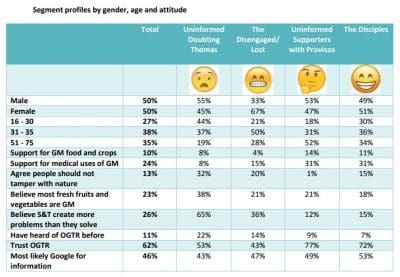COMMUNITY attitudes to genetically modified organisms (GMOs) have “settled”, according to the latest survey by the Office of Gene Technology Regulator, mirroring very closely the results from a 2015 study.
The regulator said this did not mean that attitudes won’t change rapidly if they were influenced by some external factors (for example, media coverage), but it did suggest that in the absence of such factors attitude changes would not be major.
Between the 2015 survey and this year’s survey, there was little movement in awareness and understanding of GM issues and concerns.
Those strongly opposed to GMOs are about 13 per cent of the population across different measures, and these respondents stood out as having more extreme attitudes to food and agriculture than any other group, as well as low overall trust.
Support for GMOs is more varied and cannot be given just one figure because it is so often conditional, based on regulation and safety being ensured, and the type of modification and its purpose.
“Those who supported the growing of GM crops…and those who were opposed to it were even at 36pc, with 28pc unsure.”
For example, there is a wide difference in support for GMOs in medical (63pc), industrial (55pc), environmental (54pc) and food and crops (38pc).
Those who supported the growing of GM crops in their state or territory and those who were opposed to it were even at 36pc, and with 28pc unsure. The ‘don’t know’ or ‘unsure’ ratings were high across most questions.
Segmenting the audience into four groups based on their support for GM foods, almost half the respondents were open to the production of GM food as long as regulations were in place to make sure it was safe.
About a quarter were against the production of food this way until the science could prove it was safe.
Other key findings included:
- Knowledge about what foods in Australia were genetically modified is generally poor.
- As has repeatedly been shown in previous studies, people have different attitudes towards different genetic modifications, and there is more support for modifications that are perceived to be less radical.
- Awareness of whether GM crops were grown in a respondent’s state was generally not high, varying between 14pc and 35pc correctly stating whether or not GM crops were grown in their state.
- Those organisations thought to be regulators of GM were the Department of Agriculture and Water Resources (40pc), CSIRO (36pc), the Office of the Gene Technology Regulator (31pc), the Department of Health (31pc), Food Standards Australia New Zealand (30pc), state governments (28pc), the National Health and Medical Research Council (23pc), the Therapeutic Goods Administration (22pc), and the Australian Pesticides and Veterinary Medicines Authority (16pc).
- When asked about the rules and regulations relating to GM and whether they were sufficiently rigorous and complied with, there was majority agreement but also a significant number of don’t know responses (28pc don’t know for both rules and regulations being sufficiently rigorous, and for being complied with).
- Most respondents (71pc) felt that biotechnology would improve our way of life in the future, while only 46pc felt that GMOs would improve our way of life in the future.
- Although only 43pc of people had any awareness or knowledge of synthetic biology, there was significant support for it (once given a definition) with 62pc of respondents stating they felt it would improve our way of life in the future.
- More than half the respondents (56pc) stated they were aware of gene editing and 57pc thought it might improve our way of life in the future, but 17pc thought it might make things worse. Gene editing received quite high acceptance (42pc) relative to other techniques, when asked about making a small change to an existing gene within a plant, as is done in gene editing.
Source: Office of Gene Technology Regulator. See full report here




HAVE YOUR SAY